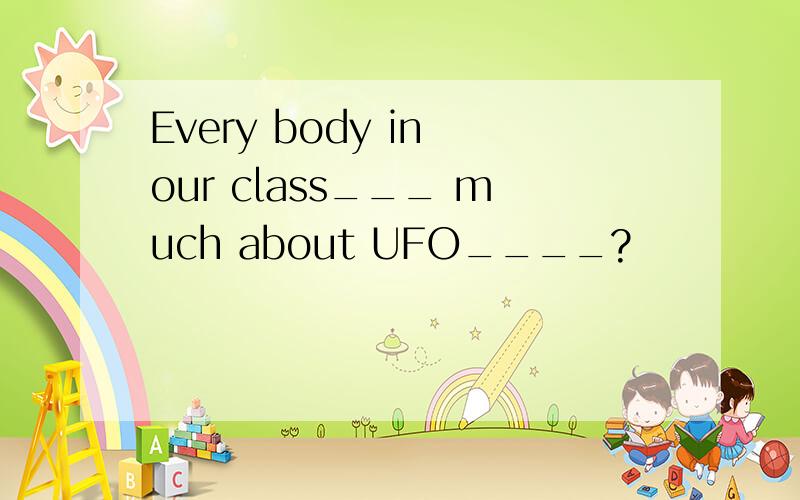Every body in our class___ much about UFO____?
来源:学生作业帮 编辑:大师作文网作业帮 分类:英语作业 时间:2024/11/19 19:55:44
Every body in our class___ much about UFO____?
Every body in our class___ much about UFO____?A.knows;does he B.know;do they C.know;doesn't he D.knsows; don't they
Every body in our class___ much about UFO____?A.knows;does he B.know;do they C.know;doesn't he D.knsows; don't they

选D
every body第三人称单数作主语,谓语动词用单数,所以应选knows
反义疑问句(The Disjunctive Question)
即附加疑问句.它表示提问人的看法,没有把握,需要对方证实.
它表示提问人的看法,没有把握,需要对方证实.反义疑问句由两部分组成:前一部分是一个陈述句,后一部分是一个简短的疑问句,两部分的人称时态应保持一致.
1.陈述部分肯定式+疑问部分否定式
2.陈述部分否定式+疑问部分肯定式
They work hare, don’t they?
She was ill yesterday, wasn’t she?
You didn’t go, did you?
He can’t ride a bike, can he?
请注意以下句型的反义疑问句的用法:
1.当陈述部分的主语是I , everyone, everything, nobody 时,后面的疑问句应表示为:
I am a student, aren’t I
Everyone is in the classroom, aren’t they?
Everything begins to grow in spring, doesn’t it?
Nobody will go, will they?
2. 当陈述部分有never,seldom, hardly,few,little,barely, scarcely, nothing 等否定词时,后面的疑问句则表示为:
There are few apples in the basket, are there?
He can hardly swim, can he?
They seldom come late, do they?
3. 当陈述部分是I think 加从句时,疑问句应和从句的人称时态保持一致.
I think chickens can swim, can’t they?
I think Lucy is a good girl, isn’t she?
I didn't think he was happy, was he?
4. 陈述部分有had better 时,疑问句应用hadn’t开头:
you’d better get up early, hadn’t you?
5.当陈述部分是祈使句时,疑问句要根据语气来表达
Let’s go out for a walk, shall we?
Let us go our for a walk, will you?
Turn on the radio, will you?
6.反义疑问句的回答用yes, no, 但是,当陈述部分是否定形式时,回答要按事实.如:
They don’t work hard, do they? 他们不太努力工作,是吗?
Yes, they do. 不,他们工作努力./No, they don’t. 对, 他们工作不努力
希望对你有帮助
every body第三人称单数作主语,谓语动词用单数,所以应选knows
反义疑问句(The Disjunctive Question)
即附加疑问句.它表示提问人的看法,没有把握,需要对方证实.
它表示提问人的看法,没有把握,需要对方证实.反义疑问句由两部分组成:前一部分是一个陈述句,后一部分是一个简短的疑问句,两部分的人称时态应保持一致.
1.陈述部分肯定式+疑问部分否定式
2.陈述部分否定式+疑问部分肯定式
They work hare, don’t they?
She was ill yesterday, wasn’t she?
You didn’t go, did you?
He can’t ride a bike, can he?
请注意以下句型的反义疑问句的用法:
1.当陈述部分的主语是I , everyone, everything, nobody 时,后面的疑问句应表示为:
I am a student, aren’t I
Everyone is in the classroom, aren’t they?
Everything begins to grow in spring, doesn’t it?
Nobody will go, will they?
2. 当陈述部分有never,seldom, hardly,few,little,barely, scarcely, nothing 等否定词时,后面的疑问句则表示为:
There are few apples in the basket, are there?
He can hardly swim, can he?
They seldom come late, do they?
3. 当陈述部分是I think 加从句时,疑问句应和从句的人称时态保持一致.
I think chickens can swim, can’t they?
I think Lucy is a good girl, isn’t she?
I didn't think he was happy, was he?
4. 陈述部分有had better 时,疑问句应用hadn’t开头:
you’d better get up early, hadn’t you?
5.当陈述部分是祈使句时,疑问句要根据语气来表达
Let’s go out for a walk, shall we?
Let us go our for a walk, will you?
Turn on the radio, will you?
6.反义疑问句的回答用yes, no, 但是,当陈述部分是否定形式时,回答要按事实.如:
They don’t work hard, do they? 他们不太努力工作,是吗?
Yes, they do. 不,他们工作努力./No, they don’t. 对, 他们工作不努力
希望对你有帮助
Every body in our class___ much about UFO____?
most boys in our class___(play)sports afte
Everyone in our class___(know)that Tom was good at drawing.
More than one student in our class___ to the Great Wall
Class___(begin)at 8:00 every day
the number of the students much in our school every year.
Every ( ) in our school ( ) good.
[ ] [ ] [ ] [ ]every Apirl in our school
i want kill every body in the world是哪首歌
歌词‘Every body in love,so put your hands up’
every muscle in my body felt alive with electricity
I feel every muscle in my body.翻译